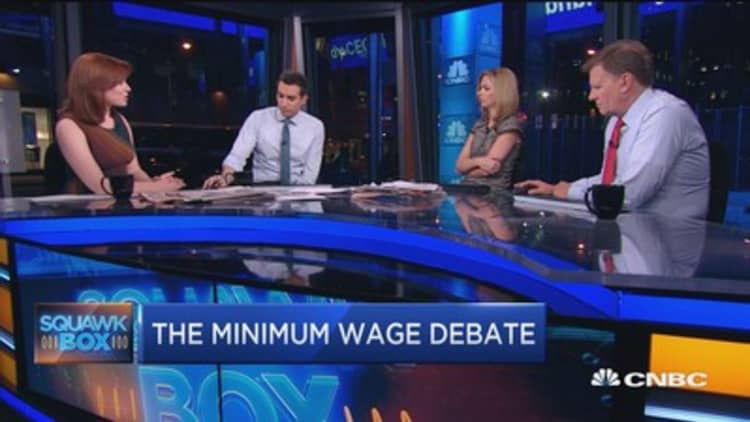As the general election draws ever closer, Main Street businesses are grappling with the idea of a higher federal minimum wage. Momentum for an increase is building. Currently 29 states and Washington, D.C., have wage floors above the current federal minimum of $7.25 an hour, and both major party presidential candidates have expressed support for a federal wage hike.
The federal minimum wage hasn't been raised since 2009. Democratic nominee Hillary Clinton has spoken out in support of a $12 wage at the federal level and $15 an hour at state and local levels when economic conditions permit. Meanwhile, Republican nominee Donald Trump has called for a new federal minimum wage of $10 an hour. Congressional Democrats have been pushing for $12 an hour by the year 2020, but, with a Republican majority in place, their efforts have stalled.
Separately, four states are considering raises for workers on November 8th: Arizona, Maine, and Colorado have $12 on the ballot, while Washington State is taking up a wage of $13.50 an hour, according to the National Employment Law Project.
Those initiatives have Sherry Wuebben of La Crosse, Wisconsin, concerned. The owner of St. Joseph Equipment, an agriculture equipment distributor, she pays her 90 workers between $14 and $15 per hour to start. An increase in the federal floor would cause her to have to scale up nearly 30 percent.
"Our cost of living here in the Midwest is much lower: housing is lower, education is lower, gas is lower, childcare is lower, all of these things are lower," said Wuebben, a third-generation business owner. "We are not on par with the different coasts, we are Middle America."
No matter which side of the debate entrepreneurs fall on, they are certainly thinking about how wage hikes may impact their business and workforce. New data from Paychex, a small business payroll and benefits provider, finds that 47 percent of small companies rated the minimum wage increase as "important or very important." What's more, 64 percent of respondents said they supported increasing the federal minimum wage, while only 36 percent said they opposed a hike.

Boulder-based Judy Amabile, owner of Product Architects, Inc., is among those who would like to see a hike. The entrepreneur, whose business makes insulated water bottles called the Polar Bottle, starts her employees at $12 an hour, a move the company made several years ago. She said it's been great for business.
"We found that all of a sudden that people could get their car fixed when it broke down, they could get to work better, they could get daycare when their kid was sick," Amabile said. "We had employees that were more productive, and our turnover pretty much disappeared. At the end of the year, we looked at our per bottle labor cost and it actually had gone down."
At the end of the year [after raising wages], we looked at our per bottle labor cost and it actually had gone down.Judy Amabilesmall business owner, Boulder, CO
Like many on Main Street, both Amabile and Wuebben expressed concerns about the election in general and the direction that the country is headed. As November nears, that feeling has become commonplace among small business owners. The National Federation of Independent Business released its monthly optimism index for September on Tuesday, showing a 0.3 point decline to 94.1, led by weaker inventories and difficulty in filling job openings.
What is of note, however, is the political uncertainty level in this month's NFIB report, which is at 35 percent, down from the all-time high seen in August of 38 percent, likely because polls are not as close as they've been in recent months. Political uncertainty continued to be the second most-commonly-cited reason for not expanding right now, behind the economy. More broadly, Paychex's survey found the top three issues in the poll this election were healthcare (77 percent), government regulation and complexity (71 percent), and tax reform (70 percent).
Health-care costs are one of the reasons some, like Wuebben, disagree with a mandatory wage hike. She says her firm has seen increases of 28 percent last year and 11 percent this year. Across the board, costs are going up, which make planning harder for smaller companies.
"It's really sad when you think that your rates are going up only 11 percent, and that's a win," Wuebben said. "It shows you just how expensive the Affordable Care Act has become. A wage increase on top of our benefits package greatly increases our cost of doing business."


